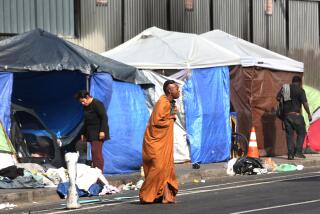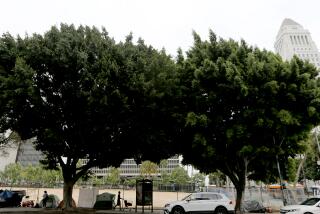Confusing alerts and nowhere to go: Homeless Angelenos exempt from curfew struggle even more
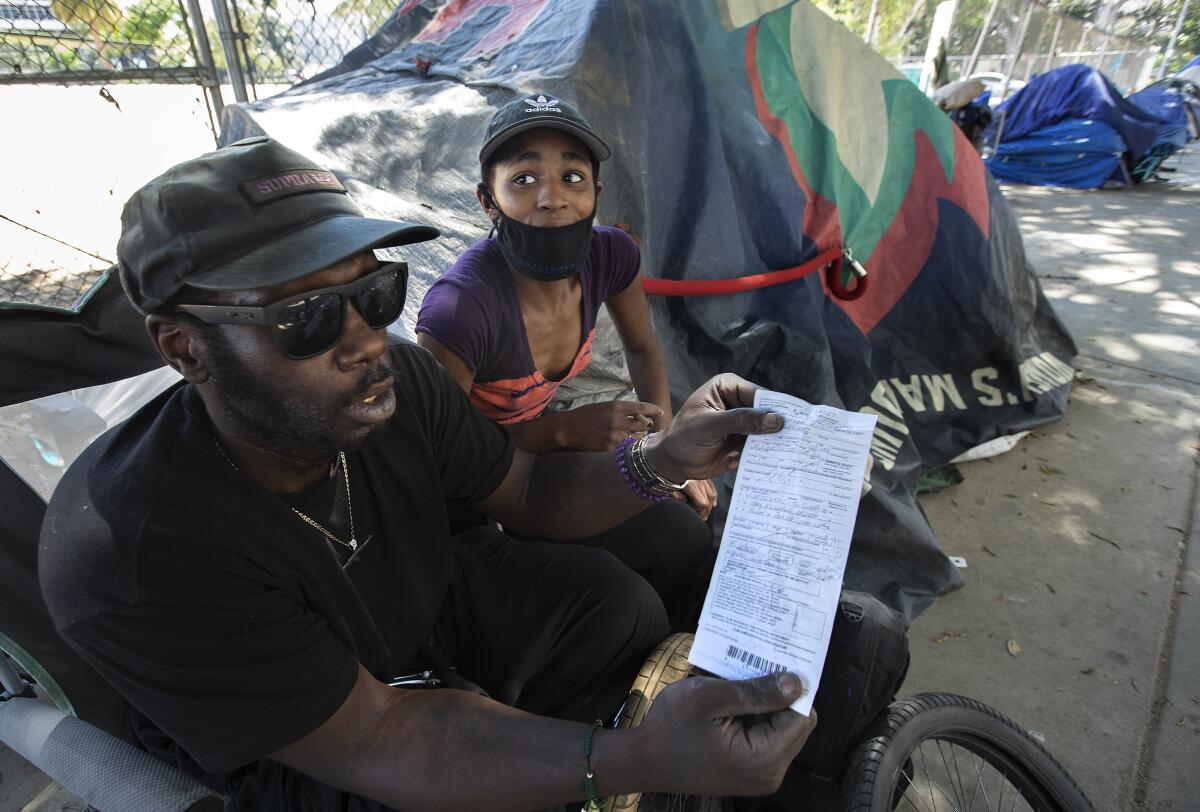
Last Friday, Maya Johnson, 18, and her boyfriend Alex Jones, 31, were returning from a late-night run for burritos to their home — a tent on 1st Street between Spring and Broadway in downtown Los Angeles.
Protests had grown outside of City Hall and the couple, who had not heard about the killing of George Floyd, decided to check out the commotion. Around 9:30 p.m. the Los Angeles Police Department declared an unlawful assembly for much of downtown and began pushing the crowd south, away from the City Hall steps.
That’s when Johnson and Jones, who have both been homeless for about two years, were arrested and cited for “failure to obey a lawful order from a peace officer,” according to a ticket Johnson received.
Jones said they sat zip-tied on the pavement and then on a bus for two hours before being booked shortly after midnight and then released. They stayed in their tent as fireworks went off all night nearby and protesters and looters passed.
“I ... just went to go see [the commotion],” Jones said. “The last few days have been very chaotic.”
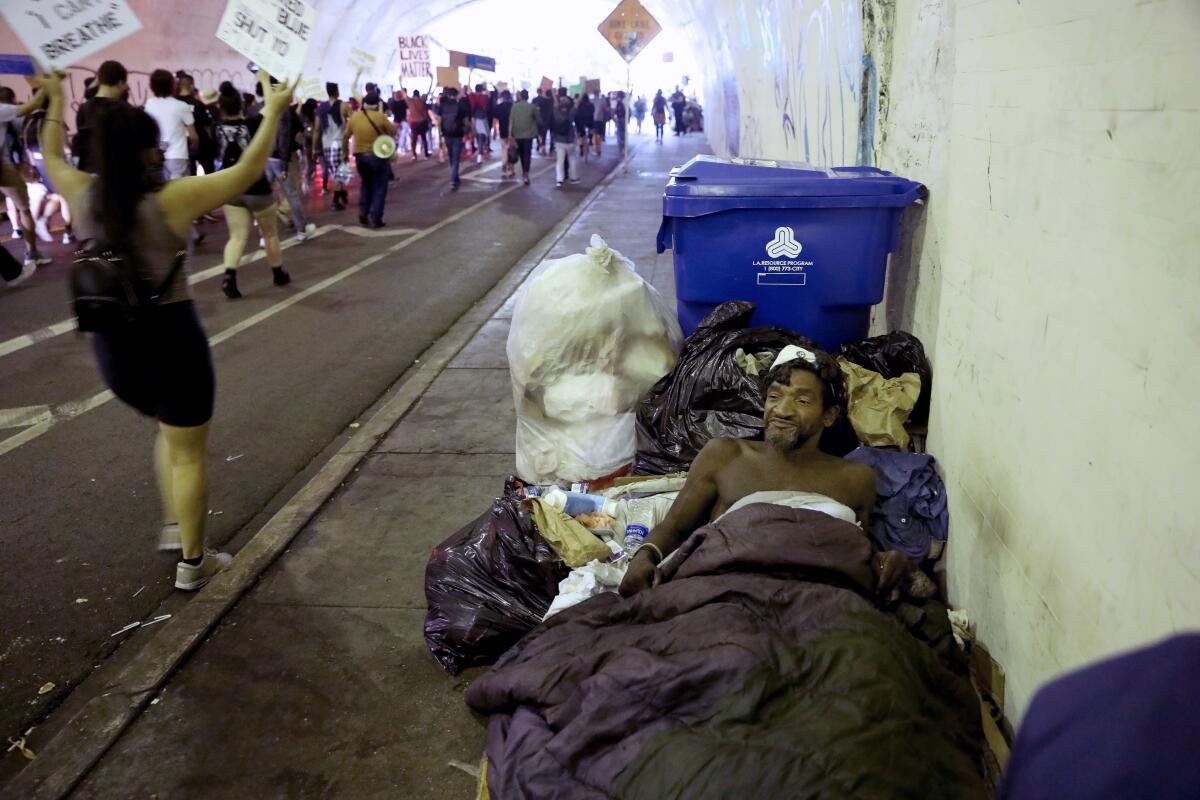
The Los Angeles County Sheriff’s Department said Thursday that it didn’t plan another countywide curfew as protests over police brutality and the death of George Floyd continue across Southern California. Los Angeles Mayor Eric Garcetti said there would be no curfew in the city of Los Angeles either.
But for several days, homeless people throughout the region were put in the uncomfortable position of obeying a curfew when their home is, at best, a tent.
Living on the street during a pandemic had already been hard — with social distancing continuing to be a challenge and the lack of access to healthcare ever present.
But Johnson and Jones, along with other homeless people, outreach workers and lawyers, all said the civil unrest of the last week, which triggered curfews throughout the county, made bedding down outside at night even harder.
In Hollywood, the curfews and looting forced stores to close for several days — making it more difficult for homeless people in that neighborhood to buy food, according to Heidi Marston, interim director of the Los Angeles Homeless Services Authority. She had been out talking to homeless people and outreach workers earlier this week.
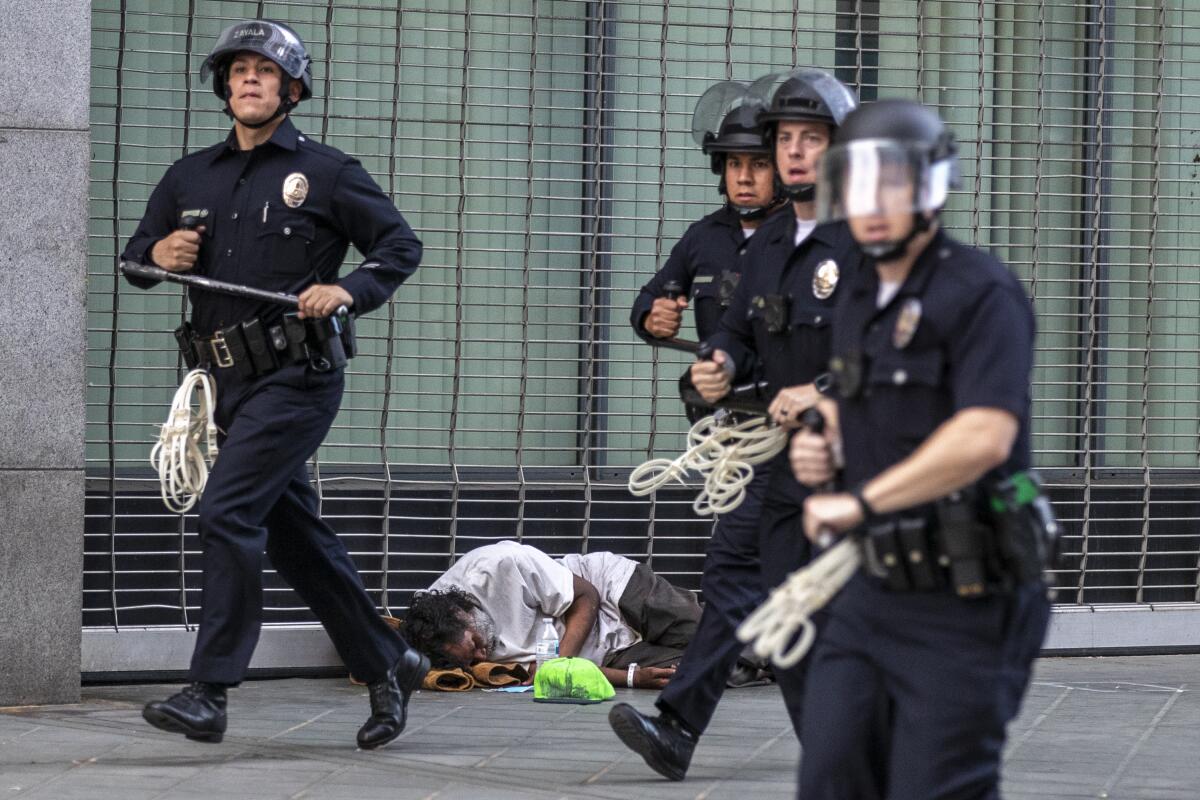
“It has hurt their ability to access food,” Marston told The Times earlier this week. “People who would go get food or have it brought to them now can’t. So we’re trying to give out extra meals. The county didn’t think about that as we thought about curfew and the ending of access to resources.”
Similarly, Melissa Acedera distributes meals to homeless people and is able to source her supplies from supermarkets who give her unsold food. But she can only pick that stuff up when she gets off work after 6 p.m. The curfews threw her organization into a state of chaos, although her brother was able to pick up the food on Monday.
“I didn’t want to risk it. I just wasn’t sure what was going on,” she said. “There’s just been so much unrest that I wasn’t sure how the police were going to deal with essential workers. I hate thinking any of them will go hungry. I always promise I will come through with a meal.”
This week she wasn’t able to.
Alerts about the curfews sowed confusion among Angelenos as overlapping jurisdictions gave what seemed like contradictory information about who could still be out after curfew. Many homeless people don’t have phones and had no way of knowing if law enforcement would arrest them. In any case, they had nowhere to go.
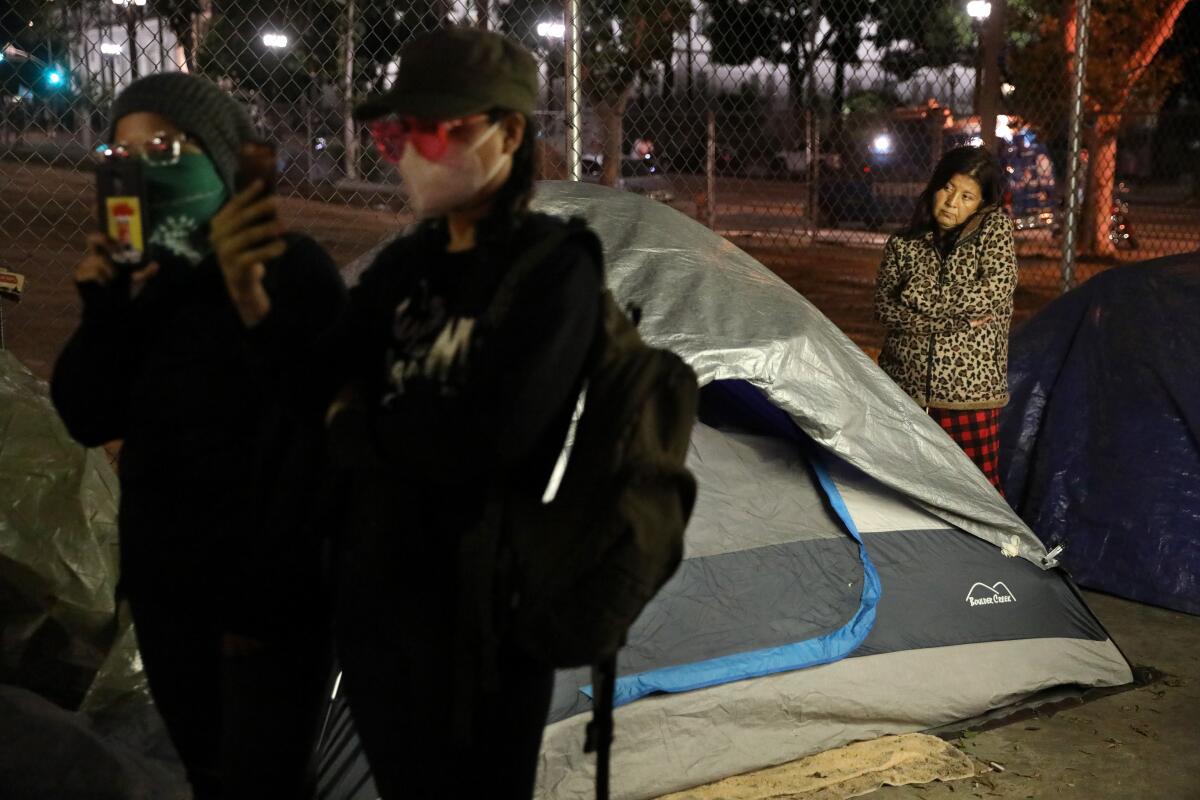
It is not clear how many homeless people may have been arrested for allegedly violating the curfew. Both the city and county curfews exempted the homeless, although that wasn’t necessarily clear in the alerts. For example, on Monday, the county’s notice explicitly exempted the homeless, but the city only specified exemptions for people “traveling to and from work, seeking or giving emergency care, and emergency responders.”
Legal Aid Foundation of Los Angeles attorney Shayla Myers said there was a several-hour period Monday when it was not clear whether homeless people were allowed to stay on the streets in Los Angeles. She said there were tens of thousands of people who were affected by the curfew, but may not have been notified, and would have had no way to adhere to it if it hadn’t exempted people living on the streets.
“I think it is enraging and incredibly problematic that all of the stated exemptions are not included in the public notice,” Myers said.
Johnson has no phone, and she and Jones made sure to not leave their tents as day turned to night last weekend and during this week. A couple of tents down, Karl Hamilton received the push alert on his phone and made sure to get food for himself well in advance of the 6 p.m. curfew.
For people with homes, staying indoors is an easier proposition. Hamilton worries that if he went out even for a moment, the LAPD might arrest him.
“It’s going down right now. I’m obeying the rules and staying in this tent.”
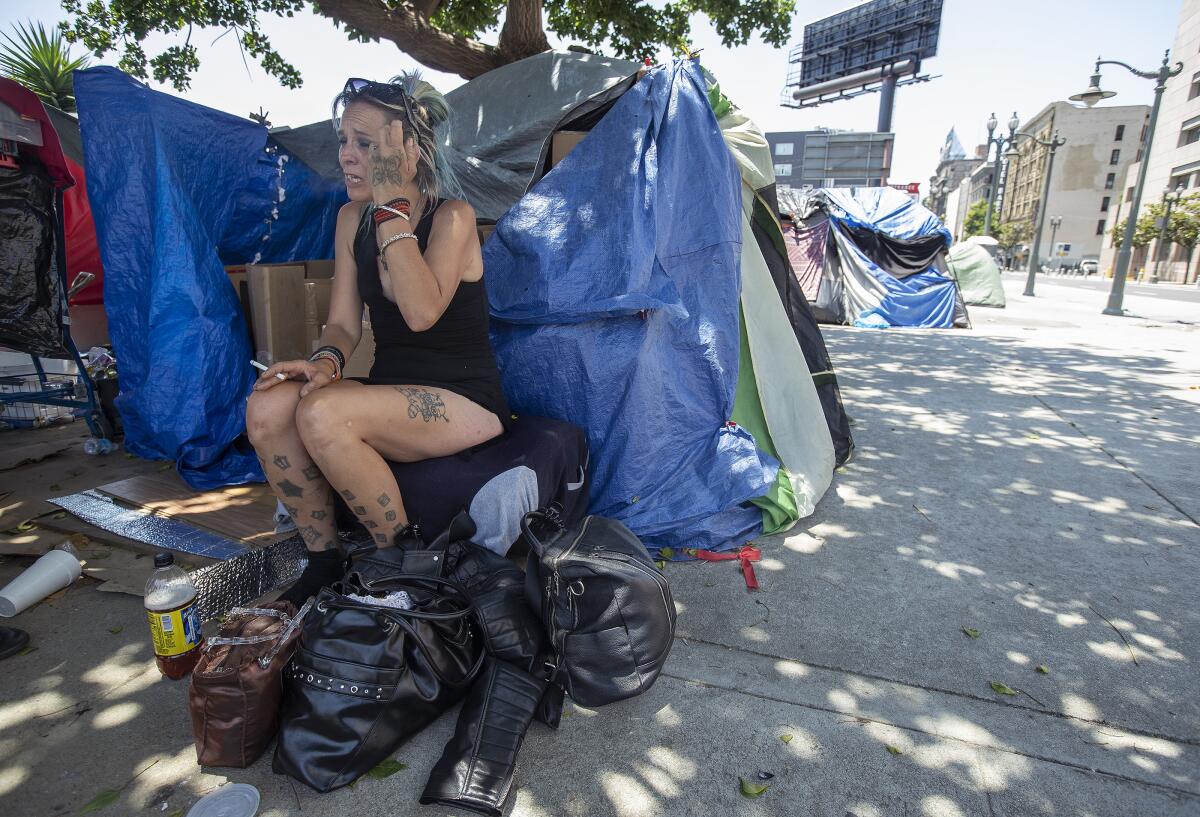
A couple of blocks away at a large, tightly packed encampment in a plaza at 3rd and Main streets, Tasha Tinsley, 41, found a sliver of shade to smoke a cigarette in on Wednesday. Her boyfriend is currently in jail, and she’s been sleeping on the streets for several months since coming to Los Angeles from Missouri.
During the unrest over the week, her tent was damaged — the poles that keep it upright were snapped. She recalled how in recent days, LAPD officers would come by to tell the people in the encampment not to leave their tents after curfew. She has hepatitis C and has been waiting three weeks to get into a hotel room that the county is providing to medically vulnerable and elderly homeless people.
Each day she hopes that will come through. For two nights, she was able to stay with a friend in Long Beach, but is now back on the street.
“I am trying to get my business done during the day,” she said, “because at night I’m not leaving my tent.”
More to Read
Sign up for Essential California
The most important California stories and recommendations in your inbox every morning.
You may occasionally receive promotional content from the Los Angeles Times.
